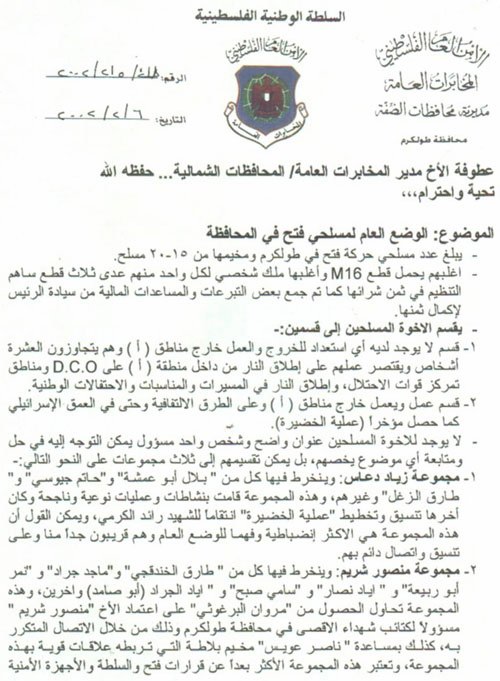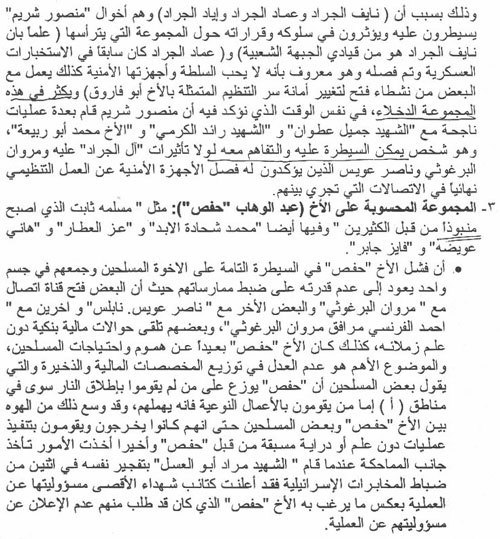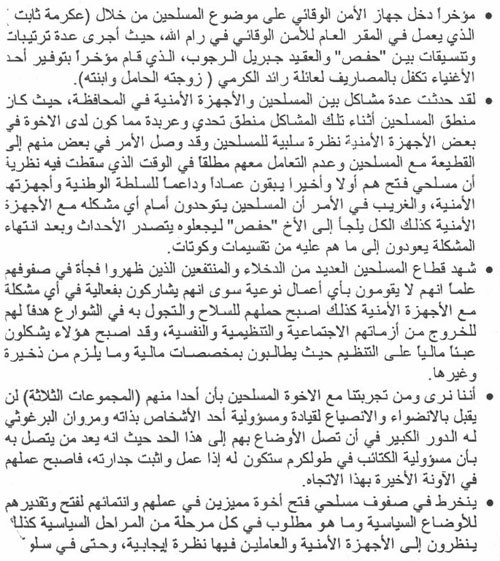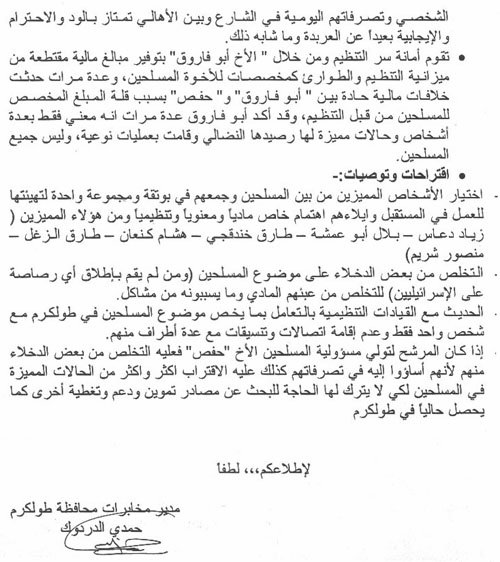Report on Arafat's Fatah in Tulkarm
(see translation below)




(see translation below)




Palestinian Authority Captured Document (IDF, 4 April 2002, TR1-248-02)
Palestinian General Security
General Intelligence
West Bank Districts Directorate
Tulkarm District
To Head of General Intelligence/Northern Districts (note: meaning Tawfik Tirawi)
Greetings,
Subject: The General Situation Among Armed Fatah Personnel in the District (Tulkarm)
1. The number of armed Fatah men in Tulkarm and in its refugee camp ranges between 15-20.
2. Most of them (the arms bearers) have M-16 assault rifles, privately owned by each, except for three rifles that the Tanzim took part in their purchase. Additionally contributions were raised and financial aid obtained from the honorable President (Arafat) to complete their cost (purchasing expenses).
3. The armed comrades are divided into two squads:
a. The part that is not willing to operate outside Area A. Their number is just over ten. Their activity comprises firing from inside Area A at the DCO, firing at areas where the occupation forces are concentrated, and (firing) during rallies and national celebrations (of the Palestinians in the Tulkarm area).
b. The active part whose activity is carried out outside Area A. These operate on bypass roads and even in the depth of Israel, as happened recently in Hadera (note: a lethal attack on January 17, 2002, perpetrated by a terrorist with an explosive belt and a rifle at a Bat-Mitzva party in Hadera; 6 Israeli civilians were killed and 25 injured in the attack).
4. The armed comrades have no clear address and no single person can be turned to for a solution (of their problems) and for keeping track of issues regarding their affairs. The (armed) men can be divided into three squads as follows:
a. The Ziad Da'as squad (this squad): includes Bilal Abu Amsha; Hatem Josi; Tareq al-Zael and other (arms bearers). This squad carried out high quality successful attacks. The last (attack) in this framework was the coordination and planning of the operation in Hadera to avenge the death of the martyr Ra'ad Karmi. It would be fair to say that this squad is the most disciplined, and its men understand the general situation. Its men are very close to us (i.e. to the General Intelligence) and maintain with us continuous coordination and contact.
b. The Mansour Sharim squad (note: he is a senior activist in a Fatah cell in Tulkarm, and linked to numerous terrorist attacks):-
(1) It contains Tarek al-Hundakji; Majid Jarad; Nimer Abu Rabi; Iyad Nasser; Sami Sabah, Iyad al-Jarad (Abu Samad) and others.
(2) This squad, by means of repeated contacts with Marwan Barghuti, is attempting to obtain Marwan Barghuti's approval to appoint Mansour Sharim as head of the Al Aqsa Martyrs Brigades in the Tulkarm district. Additionally, this squad operates with the aid of Nasser Awis, a resident of Balata refugee camp, who is closely connected to it (note: known as a senior Fatah activist in Nablus, one of the directors of terrorism of Fatah/Tanzim in Tulkarm).
(3) This squad is considered very remote from the decisions of the Fatah, the PA and the security apparatuses. This, since Naif al Jarad is among the commanders of the "Democratic Front", and since Imad al-Jarad served in the past in the military intelligence, was dismissed from it, and it is known that he does not like the PA and its security apparatuses. In addition, he (Imad al-Jarad) is working together with several Fatah activists to replace the Tanzim secretariat represented by comrade Abu Faruk (note: meaning Fa'ak Kanaan, secretary general of the Tanzim in Tulkarm).
(4) This squad does include a large number of undesirables. However, we would like to emphasize that Mansour Sharim carried out several successful operations together with the martyr Jamil Atwan, the martyr Al-Karmi and comrade Muhamed Abu Rabi. Mansour Sharim is a person who could be controlled and with whom understandings can be reached, if it were not for the (bad) influence on him of the Al Jarad family, of Marwan Barghuti and Nasser Awis by means of the ties maintained between them. The above emphasize to him the total disconnection of the security apparatuses from the organizational activities.
c. The squad identified with Abd Al Wahab (nicknamed) "Hafez" (note: known as a Tanzim activist, head of a squad that operates in Tulkarm). Among its men are Masalame Thabet, who has become a rejected and disliked person; Muhamad Shahade Al Abed; Az Al Atar; Hani Awisa and Faiz Jaber. Hafez's failure to maintain total control of the armed bearers and unite them into one entity derives from his inability to control their activities. Some of his men opened a communications channel with Marwan Barghuti, others with Nasser Awis from Nablus, and others with Ahmed Al Franci, Barghuti's escort (note: meaning Ahmed Al Barghuti, nicknamed "Al Franci", known to be Barghuti's personal aid). Some received bank transfers without this being known to others. "Hafez" is not interested in the needs of the arms bearers. It is important to note that the allocation of the financial resources and ammunition is carried out unfairly. Some of the arms bearers claim that "Hafez" distributes (money and ammunition) only to those who fire from Area A. On the other hand, he neglects those who carry out high quality attacks (i.e. operations inside Israel). The chasm between "Hafez" and some of those armed men (of Fatah) has widened to the extent that they (the arms bearers) used to depart to carry out operations without notifying "Hafez" about them in advance. Recently, these matters have come to a head, so that when the martyr Murad Abu Al Asel blew himself up on two Israeli intelligence officers, the "Al Aqsa Martyrs Brigades" claimed responsibility for the attack against "Hafez"'s will, who requested them not to take responsibility for the operation.
5. Recently the Preventive Security Apparatus (headed by Jibril Rajoub) started to deal with the issue of the arms bearers by means of Akrama Thabet, who serves in the GHQ of the Preventive Security in Ramallah. He (Akrama) carried out several arrangements and coordinations between Hafez and Col. Jibril Rajoub, who recently arranged that one of the wealthy people cover the expenses of Raíad al Karmi's family -- his pregnant wife and his daughter.
6. Between the arms bearers (of Fatah) and the security apparatuses in the district (Tulkarm) several problems arose. The approach of the arms bearers, when those problems arose was one of defiance and law breaking. Among some of the security apparatuses this gave rise to a negative attitude regarding the armed persons of the Fatah. In some cases this reached a complete breakdown of relations (between the security apparatuses and) the armed persons and lack of (joint) work with them. All this at a time when the concept developed whereby the arms bearers of the Fatah constitute first and foremost a staff and support for the Palestinian Authority and its security apparatuses. The strange thing in this context is that the arms bearers stand unified vis-a-vis any problem (arising) with the security apparatuses. Additionally, all turn to brother Hafez in order to urge him to manage matters. However, after a solution is found for the problem (created with the security apparatuses), the arms bearers return to the factions prevailing in their midst.
7. Among the armed squads there are many parasites and people with narrow interests who suddenly appeared in their ranks. It is of note that these did not carry out a single quality operation, while at the same time they took an active part in any problem that arose with the security apparatuses. Additionally, the fact that they bear arms and wander around with them in the streets has become an aim in itself and this is in order to escape their social, organizational and psychological crises. These people have become a financial onus on the organization, since they demand financial allocations, ammunition needs and so on.
8. We believe, on the basis of our experience with our arms bearing brothers that none of the three squads mentioned is not accepting the leadership and responsibility of any of those persons. Marwan Barghuti had a significant role in their situation reaching this level since (Barghuti) assured everybody who contacted him, that the responsibility of the brigades (the "Al Aqsa Martyrs Brigades") in Tulkarm will be his if he works and proves that he worthy of it. The recent activities (of the arms bearers) was conducted in this trend.
9. Amongst the Fatah arms bearers are comrades who stand out in their activity, their affiliation to Fatah, and their understanding of the political situation and what is required in each political stage. In addition, the approach of the security apparatuses and their workers is positive, and their personal daily behavior in the street and amongst the people is characterized by friendship, honor and a positive approach, without creating problems.
10. The Tanzim secretariat (in Tulkarm) provides, through Abu Farouq, sums of money which are taken from the Tanzim budget and from the emergency budget for the allocations to the arms bearers (note: the "emergency" budget -- the intention is apparently to the budget transferred by the PA leadership through the emergency committee headed by Hikham Bilawi). On a number of occasions, severe financial disagreements arose between Abu Farouq and "Hafez" due to the minimal sum allocated to the Tanzim arms bearers. Abu Farouq emphasized on a few occasions that he is interested (to pay) only in special cases to a number of persons who are credited with participation in the struggle and who carried out quality activities, and will not (pay) all arms bearers.
11. Proposals and recommendations:
a. The quality personnel amongst the arms bearers should be selected and assembled under one umbrella (and in the framework) of one group in order to train them for future activity. They should be given special attention from the material, morale and organizational aspects. These main arms bearers include: Ziad Da'as, Bilal Abu Amsha, Tareq Khandakji, Hashem, Kana'an, Tareq Al Za'el and Mansour Sharim.
b. It is necessary to remove some of the parasites who mixed in with the arms bearers and those who did not fire one projectile at Israelis, in order to discard their financial burden and the problems which they cause.
c. Contacts should be made with the commanders of the organizations regarding cooperation so that the handling of the issue of the arms bearers in Tulkarm will be carried out vis-a-vis one man, and that there should not be simultaneous contacts and coordination with a number elements (amongst the arms bearers).
d. If the candidate to assume the responsibility regarding the arms bearers is indeed the comrade "Hafez", he must remove the parasites among them, since their behavior will have a detrimental effect on him. In addition, he must draw closer and closer to the prominent figures amongst the arms bearers so that they will not have to seek other sources of supplies, support and cover, as is taking place at present in Tulkarm.
12. For your information.
Head of the (General) Intelligence in the Tulkarm District
Hamdi Al Darduch
(Signature)